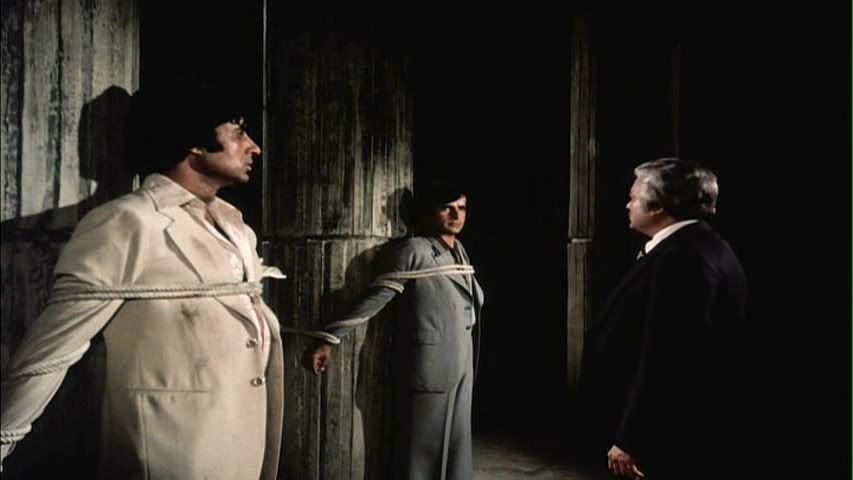
The usual family argument with a hint of masala.
We saw a tagline for Trishul somewhere that called it (rather lamely): A Sequel to Kabhi Kabhie... Of Sorts. Well, yes, it is a sequel... of sorts. Both films are directed by Yash Chopra. Both films have lots of familial drama. And all the KK alumni are back: Amitabh, Shashi, Rakhee, Sanjeev Kumar. Wait, was Rakhee in Kabhi Kabhie? No, it was Jaya. No, it was... OK, we're too lazy to check, so whoever it was, a lot of people from Kabhi Kabhie are in this one again. Except for Rishi Kapoor, thank God. But apart from the same players, Trishul really is quite different from the earlier Chopra film. It has, for one, a much stronger plot, which centers on the elaborate revenge an illegitimate son takes on his father. A rarity in Hindi films, the drama centers on business takeovers and corporate espionage rather than tears and domestic fights. Yes, Amitabh does pack some punch for us, but he also packs some cheeky economics. How refreshing!
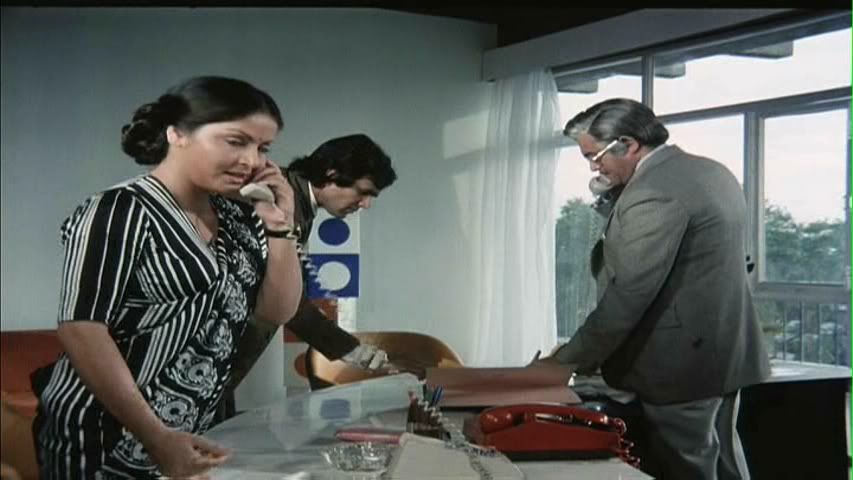
Instead of guns we use phones.
Cue the prologue. Once, long ago, an ambitious youngster hereafter named Patriarch (Sanjeev Kumar) loved a girl named Shanti (Waheeda Rehman). He loved her so much he wanted to marry her. But his mother would not approve: why get married for love, she said, when you can get married for riches and inherit a huge company? Touché, Patriarch said and dumped Shanti. Shanti, naturally stunned, gathered herself enough to put a curse on his family. And then she also had his illegitimate son, who, naturally, grew up into the hardened Angry Young Man of 1970s Bollywood (also known as Amitabh Bachchan, but we'll just call him AYM). AYM was so angry that he took an MBA and went into real estate. He also lit dynamite fuses with his cigarettes in a clever symbolism of his own short fuse. Once he came of age and Shanti expired from bitterness, he set off to find Patriarch and extract revenge. His modus operandi would be to slowly steal the market away from his father's construction company, so that, as AYM puts it, "The sign Shanti Constructions will be seen all over Delhi!" Patriarch, while admiring his young competitor's chutzpah and slightly bewildered by his ferocious competitiveness, never seems to put two and two together and recognize his illegitimate son: yes, it's Shanti Constructions as in your rejected girlfriend Shanti, dummy! "Huh, how strange," father says more than once, "it's almost like he has something personal against me." No shit, Sherlock.
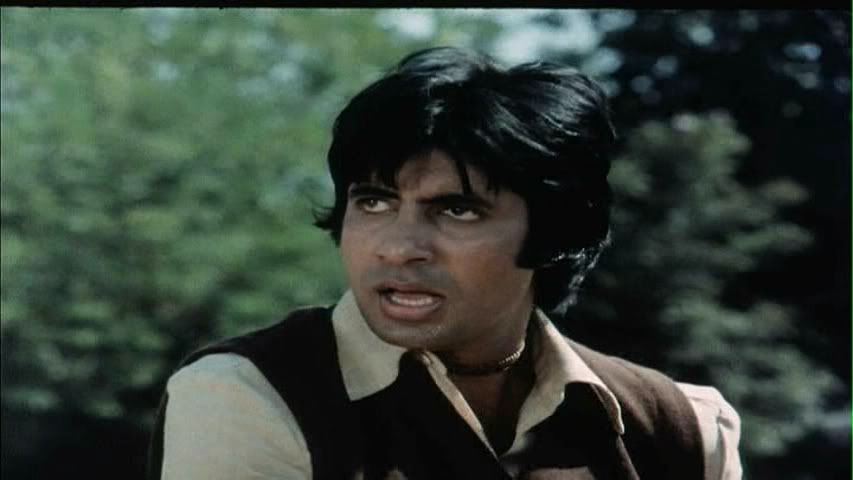
I am so... freaking... angry. (Note the choker.)
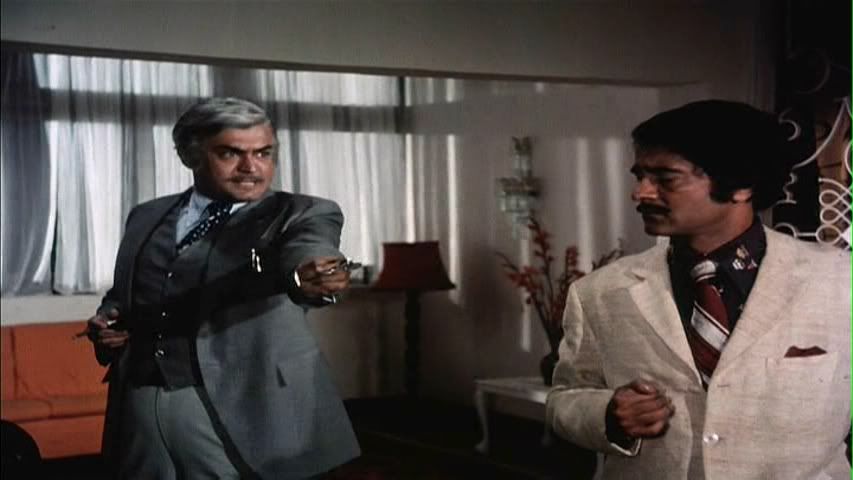
I am the pater familias! I must pay for my sins!

I am the legitimate son and certified dandy. All the buttons fell off of my shirt, sorreez.
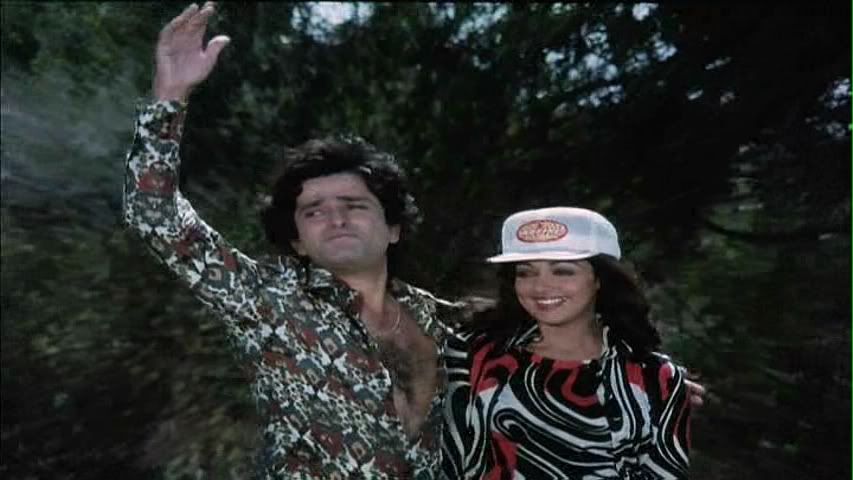
The PPCC's favorite moment.
Meanwhile, Patriarch has been procreating some legitimate children: notably the pampered dandy Shekhar (Shashi Kapoor... of course) and the Hindustani-style valley girl, Bubbly (Poonam Dhillon). Both children have grown up in the lap of luxury, and it shows. Yet AYM feels conflicted. The pull of siblinghood is strong - and one of them is Shashi, after all, his trusty sidekick in so many other incarnations - yet AYM's hatred for Patriarch is stronger, so AYM decides to make his semi-siblings suffer too. He does so, meanwhile ensnaring the not-so-loyal former secretary of Patriarch. As AYM attempts to sabotage one of Brother's innumerable love affairs, Brother picks up on something being off. Sister is too lightheaded to realize.
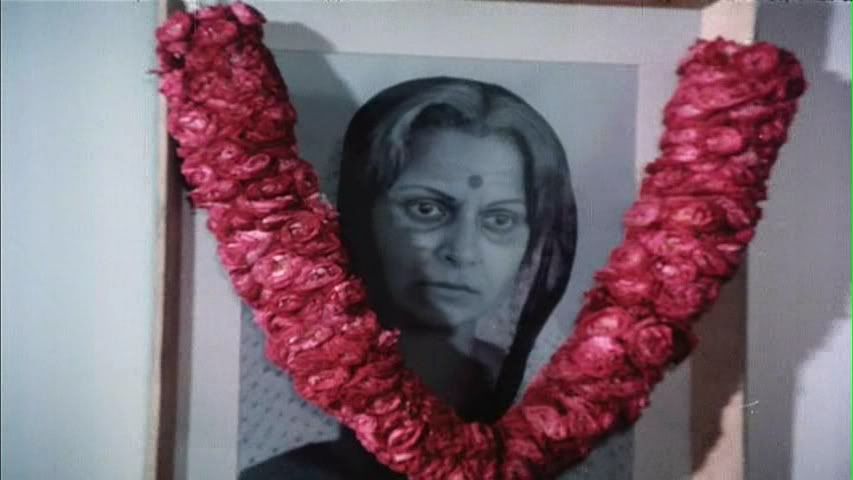
The mom. I hex you! Hex, hex!
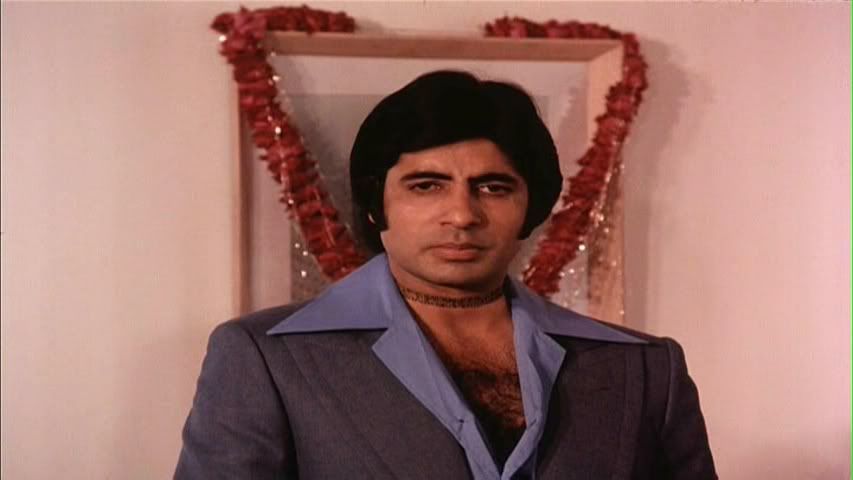
Visual pun. Nice.
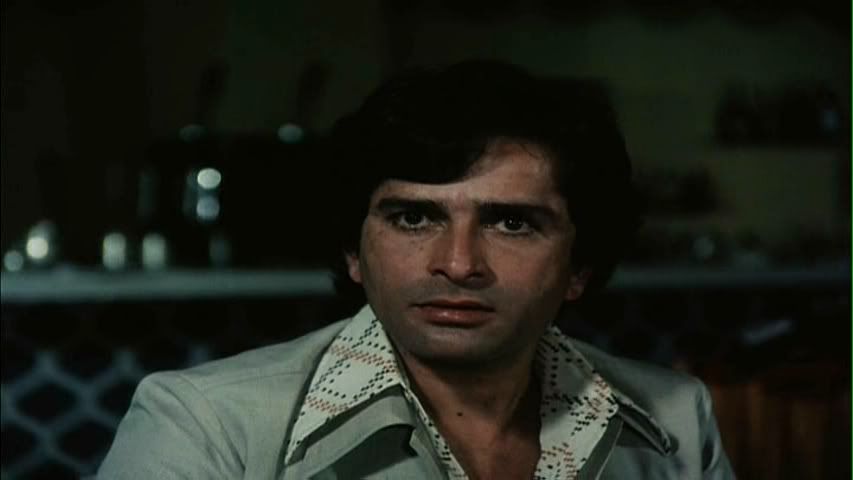
Shashi is so good at registering shock. See Fakira.
Yes, it's all very epic, and, according to Iowa, there are shades of Kalyug, which had shades of the Mahabharata. It's a bit like Ridley Scott's Gladatior: star-studded, snappy, with vague, but satisfying, historical oomph to it.
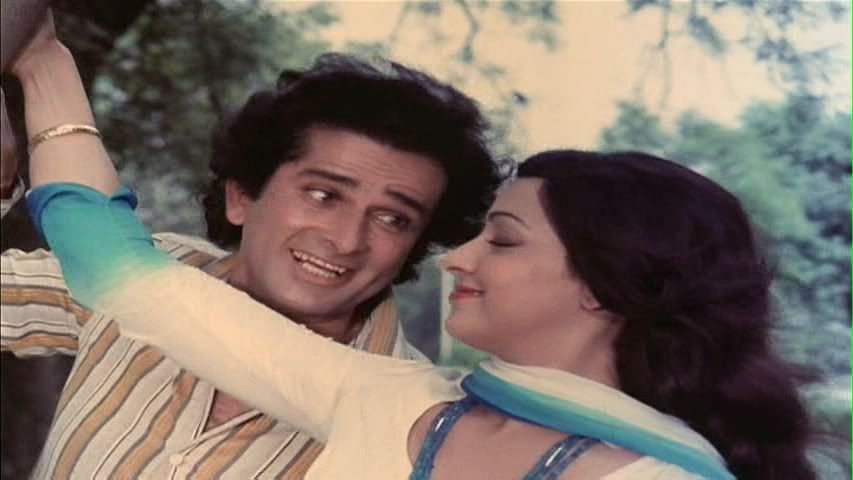
Shashi and Hema being cute, with Shashi starting to resemble his much older self.
Onto the actors, songs, and hooplah. Mostly everyone reprises their archetypes for Trishul: Amitabh, as usual, the working-class Angry Young Man we have all known and loved from such films as Zanjeer, Deewaar, and Suhaag, Shashi as his bourgeoise, romantic hero brother, Hema Malini as the frothy love interest, Sanjeev Kumar as the righteous patriarchal figure (see also Sholay or Silsila), Rakhee as the possible Amitabh love interest and goody-two-shoes, and then some young pups we didn't recognize and who didn't make much of an impression. The fact that everyone is playing their Cinematic Egos lends an air of comforting familiarity for anyone who knows 1970s masala. No one really deserves comment, though we do make special notice of Amitabh's choker (the man may be bitter, but he also had style) and Shashi's wonderful ability to register shock.
A classic with Shashi, Hema, yoga, and Shashi's chest hair.
Eagle ears Iowa note that this is the only song where Amitabh's AYM actually sings.
The dennouement is somewhat unsatisfying, even though we more or less saw it coming (Patriarch had crossed that moral threshold of recognizing legitimacy, after all). The film is most enjoyable in its moments of stereotypical masala goodness with a little more weight to it: all of AYM's interactions with Patriarch are juicy fun, and all of Shashi and Hema's songs are as sweet and lovable as they are.


2 comments:
Gladiator made me want to throw actual Roman artifacts through the screen - then again, my dad is a Roman historian, so I was trained to scowl at things like that.
Anyway. Trishul. I saw it but the subtitles were so horrible that I don't feel qualified to talk about the movie. (The comments on my post about Trishul have some lively, you might say, discussion in them about said topic, if you're interested.) However, even without knowing the finer points, clearly Amitabh is Very Angry. This was my introduction to hard-core AYM, and I was impressed. As for Shashi, I like him a lot better in Kabhi Kabhie because his character is a bit too smug and smarmy here. Not that I'd be able to resist, I'm sure, but still.
Post a Comment